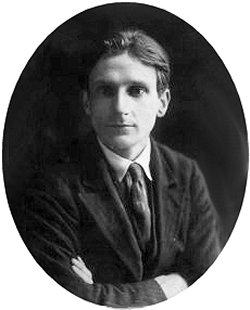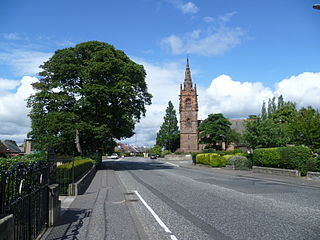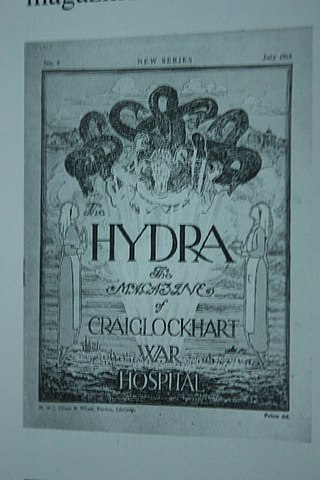Related Research Articles

Captain Robert von Ranke Graves was an English poet, historical novelist and critic. His father was Alfred Perceval Graves, a celebrated Irish poet and figure in the Gaelic revival; they were both Celticists and students of Irish mythology.

Siegfried Loraine Sassoon was an English war poet, writer, and soldier. Decorated for bravery on the Western Front, he became one of the leading poets of the First World War. His poetry both described the horrors of the trenches and satirized the patriotic pretensions of those who, in Sassoon's view, were responsible for a jingoism-fuelled war. Sassoon became a focal point for dissent within the armed forces when he made a lone protest against the continuation of the war with his "Soldier's Declaration" of July 1917, which resulted in his being sent to the Craiglockhart War Hospital. During this period he met and formed a friendship with Wilfred Owen, who was greatly influenced by him. Sassoon later won acclaim for his prose work, notably his three-volume, fictionalised autobiography, collectively known as the Sherston trilogy.

Wilfred Edward Salter Owen MC was an English poet and soldier. He was one of the leading poets of the First World War. His war poetry on the horrors of trenches and gas warfare was much influenced by his mentor Siegfried Sassoon and stood in contrast to the public perception of war at the time and to the confidently patriotic verse written by earlier war poets such as Rupert Brooke. Among his best-known works – most of which were published posthumously – are "Dulce et Decorum est", "Insensibility", "Anthem for Doomed Youth", "Futility", "Spring Offensive" and "Strange Meeting". Owen was killed in action on 4 November 1918, a week before the war's end, at the age of 25.

Edmund Charles Blunden was an English poet, author, and critic. Like his friend Siegfried Sassoon, he wrote of his experiences in World War I in both verse and prose. For most of his career, Blunden was also a reviewer for English publications and an academic in Tokyo and later Hong Kong. He ended his career as Professor of Poetry at the University of Oxford. He was nominated for the Nobel Prize in Literature six times.

Regeneration is a historical and anti-war novel by Pat Barker, first published in 1991. The novel was a Booker Prize nominee and was described by the New York Times Book Review as one of the four best novels of the year in its year of publication. It is the first of three novels in the Regeneration Trilogy of novels on the First World War, the other two being The Eye in the Door and The Ghost Road, which won the Booker Prize in 1995. The novel was adapted into a film by the same name in 1997 by Scottish film director Gillies MacKinnon and starring Jonathan Pryce as Rivers, James Wilby as Sassoon and Jonny Lee Miller as Prior. The film was successful in the UK and Canada, receiving nominations for a number of awards.

Captain Charles Hamilton Sorley was a British Army officer and Scottish war poet who fought in the First World War. He was killed in action during the Battle of Loos in October 1915.

"Anthem for Doomed Youth" is a poem written in 1917 by Wilfred Owen. It incorporates the theme of the horror of war.
"Dulce et Decorum est" is a poem written by Wilfred Owen during World War I, and published posthumously in 1920. Its Latin title is from a verse written by the Roman poet Horace: Dulce et decorum est pro patria mori. In English, this means "it is sweet and fitting to die for one's country". The poem is one of Owen's most renowned works; it is known for its horrific imagery and its condemnation of war. It was drafted at Craiglockhart in the first half of October 1917 and later revised, probably at Scarborough, but possibly at Ripon, between January and March 1918. The earliest known manuscript is dated 8 October 1917 and is addressed to the poet's mother, Susan Owen, with the note "Here is a gas poem done yesterday ."

Craiglockhart Hydropathic, now a part of Edinburgh Napier University and known as Craiglockhart Campus, is a building with surrounding grounds in Craiglockhart, Edinburgh, Scotland. As part of a large extension programme by the university in the early 2000s the original building and surrounding campus underwent significant restoration and modernisation as a result many of the original interior features of the building are no longer visible. The exterior of the building has been preserved.

Edinburgh Napier University is a public university in Edinburgh, Scotland. Napier Technical College, the predecessor of the university, was founded in 1964, taking its name from 16th-century Scottish mathematician and philosopher John Napier. The technical college was inaugurated as a university in 1992 by Lord Douglas-Hamilton, becoming Napier University. In 2009, the university was renamed Edinburgh Napier University.

Craiglockhart is a suburb in the south west of Edinburgh, Scotland, lying between Colinton to the south, Morningside to the east Merchiston to the north east, and Longstone and Kingsknowe to the west. The Water of Leith is also to the west.
"Insensibility" is a poem written by Wilfred Owen during the First World War which explores the effect of warfare on soldiers, and the long- and short-term psychological effects that it has on them. The poem's title refers to the fact that the soldiers have lost the ability to feel due to the horrors which they faced on the Western Front during the First World War.

The Hydra was a magazine produced by the patients of the Craiglockhart War Hospital, noteworthy for having been edited at one time by Wilfred Owen, and for including poems by Siegfried Sassoon. The magazine was headquartered in Edinburgh. Another editor was Black Watch officer James Bell Salmond, who went on to be editor of The Scots Magazine and was later the Keeper of Muniments at the University of St Andrews. In 1918 George Henry Bonner became the editor. The magazine ceased publication the same year.

Regeneration is a 1997 British film, an adaptation of the 1991 novel of the same name by Pat Barker. The film is directed by Gillies MacKinnon. It was released as Behind the Lines in the US in 1998. The film follows the stories of a number of officers of the British Army during World War I who are brought together in Craiglockhart War Hospital where they are treated for various traumas. It features the story of Siegfried Sassoon, his open letter reprinted in The Times criticising the conduct of the war and his return to the front.
Under the Red Robe is a historical novel by Stanley J. Weyman, first published in 1894. Often described as his best work, it was also the most commercially successful, going through 34 reprints, the last in 1962.
Stephen MacDonald was a British actor, director and dramatist.

"The Dead-Beat" is a poem by Wilfred Owen. It deals with the atrocities of World War I.
Owen Thomas is a playwright, originally from Mid Wales who is now living and working in Cardiff.

Soldier's Dream is a poem written by English war poet Wilfred Owen. It was written in October 1917 in Craiglockhart, a suburb in the south-west of Edinburgh (Scotland), while the author was recovering from shell shock in the trenches, inflicted during World War I. The poet died one week before the Armistice of Compiègne, which ended the conflict on the Western Front.
James Bell Salmond, better known as J. B. Salmond, was a Scottish journalist, poet and novelist. During the First World War he wrote poetry and, with Wilfred Owen, was for a time joint editor of The Hydra, a journal published within Craiglockhart Military Hospital in Edinburgh.
References
- ↑ Daniel Meyer-Dinkgrafe (2005). Biographical Plays About Famous Artists. Cambridge Scholars Pub. p. 25. ISBN 9781443814621.
- ↑ "Not About Heroes", Geoffrey Whitworth Theatre.
- ↑ McGann Brothers
- ↑ RGP Productions